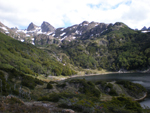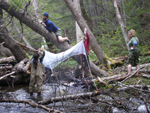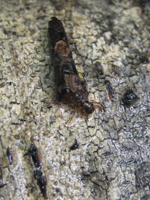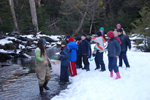Freshwater Insects of the Cape Horn Biosphere Reserve, Chile
Dissertation title: Benthic macroinvertebrates of temperate, sub-Antarctic streams: the effects of altitudinal zoning and temperature on the phenology of aquatic insects associated to the Róbalo River, Navarino Island (55°S), Chile

- Laguna del Salto & Róbalo River
Throughout North America and Europe, the interest for the study of benthic macroinvertebrates has led to a better understanding of the taxonomy of this group and the ecological dynamics within freshwater ecosystems. These studies have included research such as population dynamics, competition studies, predator-prey interactions, and trophic dynamics. The information from these studies has led to improved ecological theories and the ability to use invertebrates in the determination of an ecosystem’s overall health.

- Malaise Trap in the Róbalo River Watershed
While a significant amount of the research on aquatic insects has taken place in the northern hemisphere, similar amounts of research have not been conducted in the sub-Antarctic Magallanes region of Chile. Since 2002, Omora Park researchers have been studying the ecology of sub-Antarctic streams in the Cape Horn Biosphere Reserve. Much of this work has focused on the effects of invasive, exotic species, such as the beaver and trout.

- Case-making Caddisfly from the Róbalo River

- Workshop with Puerto Williams School Children